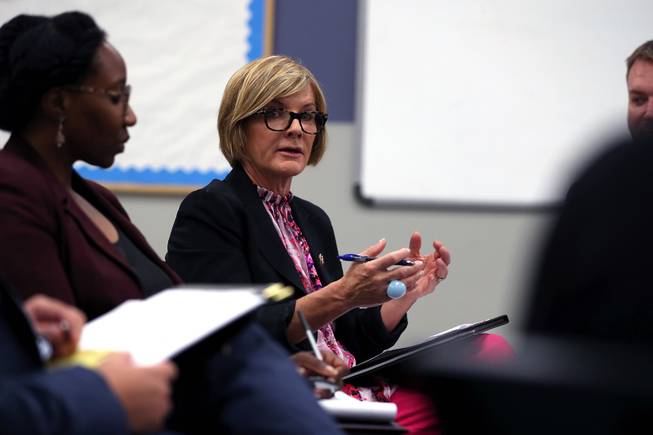
Rep. Susie Lee speaks during a roundtable discussion to highlight the importance of protecting Southern Nevada senior citizens from fraud and abuse, at the Henderson Multigenerational Center on Monday, July 29, 2019.
Monday, July 29, 2019 | 3 p.m.
The robocall epidemic in America has hit almost everybody, but one demographic is highly targeted — senior citizens.
U.S. Rep. Susie Lee, D-Las Vegas, held an event today to discuss the issue with senior advocates, days after she voted to pass the Stopping Bad Robocalls Act. The bill targets scammers by requiring call authentication technology.
“Nevada and Congressional District 3 is home to a large number of senior citizens who represent probably (the) most vulnerable part of our community,” said Lee, who represents the district and is a co-sponsor of the bill.
Research by Comparitech, a technology and security website, found Nevada seniors could lose about $742 million a year in fraudulent schemes. And according to a report by the state, from 2017 to 2018 there were 411 substantiated reports of elder exploitation — defined as an abuse of trust designed to gain control of finances.
Lori Powers, outreach coordinator for the Nevada Senior Medicare Patrol, an organization that educates seniors about health care fraud, talked about a scam seniors could fall victim to that reaches beyond robocalls.
Seniors may get medical equipment, such as a back brace or wheelchair, delivered to their home without ordering it, and the sender bills Medicare for it, Powers said. “In some cases, these providers aren’t even giving the back brace; they’re just charging Medicare,” she said.
Victims to such scams may find that Medicare then won’t pick up the cost of a device when it’s truly needed, said Melissa McDonald, the group’s volunteer coordinator.
U.S. Sen. Catherine Cortez Masto, D-Nev., has also introduced a bill that would penalize Telephone Consumer Protection Act violators with up to a year in prison and increase the maximum fine for falsifying a caller ID number to $20,000.
People are encouraged to immediately contact the police if they think they have been scammed, and organizations such as the AARP will help seniors who are victims of scams by linking them to agencies that can help.

